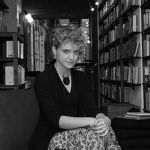 Laura Accerboni (Italy) was born in Genoa and currently lives in Lugano. She graduated in Modern Literature at the University of Genoa. Her poems have been published in several literary reviews, such as Italian Poetry Rewiew, Poesia or Steve. In 2012 she released the poetry book Attorno a ciò che non è stato (Edizioni del Leone), and in 2015 the book La parte dell'annegato (Nottetempo). She won several national and international literary awards, such as the Piero Alinari prize in 2011. Since 2012 she has been member of the editorial committee of the Steve poetry review, contributing with reviews and translations. Together with the Italian poet Elio Grasso she translated the poetry anthology Philtrum by the American poet Taje Silverman. Laura Accerboni (Italy) was born in Genoa and currently lives in Lugano. She graduated in Modern Literature at the University of Genoa. Her poems have been published in several literary reviews, such as Italian Poetry Rewiew, Poesia or Steve. In 2012 she released the poetry book Attorno a ciò che non è stato (Edizioni del Leone), and in 2015 the book La parte dell'annegato (Nottetempo). She won several national and international literary awards, such as the Piero Alinari prize in 2011. Since 2012 she has been member of the editorial committee of the Steve poetry review, contributing with reviews and translations. Together with the Italian poet Elio Grasso she translated the poetry anthology Philtrum by the American poet Taje Silverman. |
|
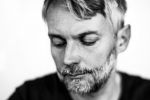 Petr Borkovec (Czech Republic) was born in Louňovice pod Blaníkem in the middle of Czech Republic. He worked as an editor at Souvislost revue, Lidové noviny publishing house and for newspapers Lidové noviny and Literární noviny. He currently works as a dramaturge in café Fra and an editor at the publishing house Fra. Since 1990 he has published fifteen books of poetry, prose and children's literature. His most recent books are a collection of poetry titled Wernisch (2015) and a collection of short stories titled Lido di Dance (2017); he also wrote poetry books for children, O čem sní [What they are dreaming of] (2017) and Věci našeho života [The things in our lives] (2017). His collections and books were published in Germany, Austria, United Kingdom and Italy. He translated poetry by Vladislav Khodasevich, Vladimir Nabokov, Yevgeny Rein, Joseph Brodsky and others. In cooperation with Matyáš Havrda, he translated Sofocles' Oedipus Rex and Aeschylus' Oresteia. Petr Borkovec (Czech Republic) was born in Louňovice pod Blaníkem in the middle of Czech Republic. He worked as an editor at Souvislost revue, Lidové noviny publishing house and for newspapers Lidové noviny and Literární noviny. He currently works as a dramaturge in café Fra and an editor at the publishing house Fra. Since 1990 he has published fifteen books of poetry, prose and children's literature. His most recent books are a collection of poetry titled Wernisch (2015) and a collection of short stories titled Lido di Dance (2017); he also wrote poetry books for children, O čem sní [What they are dreaming of] (2017) and Věci našeho života [The things in our lives] (2017). His collections and books were published in Germany, Austria, United Kingdom and Italy. He translated poetry by Vladislav Khodasevich, Vladimir Nabokov, Yevgeny Rein, Joseph Brodsky and others. In cooperation with Matyáš Havrda, he translated Sofocles' Oedipus Rex and Aeschylus' Oresteia.
|
 Eleni Cay (Slovakia) is a Slovakian-born poet living in Manchester, UK. Her poems were published in two pamphlets - Colours of the Swan and Autumn Dedications - and featured in MK Calling 2013 & 2015. She's widely published in anthologies such as Mother's Milk, poetry magazines such as Envoi and Atticus Review, on Button Poetry and on the 'best poetry videos on the web' ('Moving Poems'). A full collection of translated poems was published by Parthian Books in July 2017 and a pamphlet is due in autumn 2017 by Eyewear Press (The Lorgnette Pamphlet Series). Eleni Cay (Slovakia) is a Slovakian-born poet living in Manchester, UK. Her poems were published in two pamphlets - Colours of the Swan and Autumn Dedications - and featured in MK Calling 2013 & 2015. She's widely published in anthologies such as Mother's Milk, poetry magazines such as Envoi and Atticus Review, on Button Poetry and on the 'best poetry videos on the web' ('Moving Poems'). A full collection of translated poems was published by Parthian Books in July 2017 and a pamphlet is due in autumn 2017 by Eyewear Press (The Lorgnette Pamphlet Series). |
 Julien Delmaire (France) writes poetry, novels and plays. He has been performing in France and abroad for more that fifteen years. Julien Delmaire organizes numerous writing workshops in schools, psychiatric hospitals, prisons and libraries. He also runs a literary blog, "Nous, Laminaires". His first novel, Georgia (Editions Grasset), won the Prix Littéraire de la Porte Dorée. He published Bogolan in 2015 (Le Temps des Cerises éditeur) and Rose Pirogue in 2016 (Editions mémoire d'Encrier). Julien Delmaire (France) writes poetry, novels and plays. He has been performing in France and abroad for more that fifteen years. Julien Delmaire organizes numerous writing workshops in schools, psychiatric hospitals, prisons and libraries. He also runs a literary blog, "Nous, Laminaires". His first novel, Georgia (Editions Grasset), won the Prix Littéraire de la Porte Dorée. He published Bogolan in 2015 (Le Temps des Cerises éditeur) and Rose Pirogue in 2016 (Editions mémoire d'Encrier). |
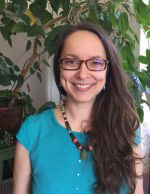 Zsuzsa Emese Csobánka (Hungary) is a poet, writer and teacher. She graduated from Loránd Eötvös University, Budapest as a certified teacher of Hungarian grammar and literature with an MSs degree and from the University of Theatre and Film Arts, Budapest. In 2016 she also finished her doctorate at the Science of Education Doctoral Program at Loránd Eötvös University. The topic of her thesis was: Opportunities of teaching contemporary literature in class. As a scholar, she received a scholarship in Cracow (Jadwiga Fund, Poland and Balassi Campus, Hungary) and became involved in Pilsen 2015 project in the Czech Nectiny in 2013. She also participated at Kikinda Short Story Festival in Serbia. She received several Hungarian Literature Scholarships for her short stories. Among her books are Bog (poems, Szoba, 2009), Cold evils (poems, Kalligram, 2011), Fingering Me (novel, PRAE.HU + JAK, 2011), Almost Auschwitz (novel, Kalligram, 2013), The missing body (novel, Kalligram, 2014) and Every harbor (poems, Kalligram, 2015). Zsuzsa Emese Csobánka (Hungary) is a poet, writer and teacher. She graduated from Loránd Eötvös University, Budapest as a certified teacher of Hungarian grammar and literature with an MSs degree and from the University of Theatre and Film Arts, Budapest. In 2016 she also finished her doctorate at the Science of Education Doctoral Program at Loránd Eötvös University. The topic of her thesis was: Opportunities of teaching contemporary literature in class. As a scholar, she received a scholarship in Cracow (Jadwiga Fund, Poland and Balassi Campus, Hungary) and became involved in Pilsen 2015 project in the Czech Nectiny in 2013. She also participated at Kikinda Short Story Festival in Serbia. She received several Hungarian Literature Scholarships for her short stories. Among her books are Bog (poems, Szoba, 2009), Cold evils (poems, Kalligram, 2011), Fingering Me (novel, PRAE.HU + JAK, 2011), Almost Auschwitz (novel, Kalligram, 2013), The missing body (novel, Kalligram, 2014) and Every harbor (poems, Kalligram, 2015). |
 Sylvia Geist (Germany) was born in Berlin. She studied chemistry, German studies and art history at the Technical University of Berlin. From 1992 she was an editor and publisher, she led several seminars at the University of Applied Sciences in Hannover and she contributed to several literary and interdisciplinary project. For a time, she was writing for Financial Times Deutschland as a reviewer. She is an author of poetry collections such as Gordian Paradise (Gordisches Paradies. Gedichte, Hanser Berlin Verlag, 2014), Before the Weather (Vor dem Wetter. Gedichte, Luftschacht Verlag, 2009) and many others, as well as an author of several books of poetry, articles and reviews. As a publisher, she is responsible for numerous poetry collections, books of prose and anthologies of central European literature. She translated works from John Ashbery, Peter Gizzi or Chirikure Chirikure. Her new volume of poetry will be published in spring 2018 under the title Fremde Felle (Strange Furs) at Hanser Berlin Verlag. The latest award she received was the ver.di Literaturpreis in 2014, and a residency at the Villa Decius in Krakow in 2015. A poetry collection in Slovak translation of Martina Straková titled Ráno modré zviera a iné básne (Morning Blue Animal And Other Poems, was published in the Ars Poetica Publishing House this year. Sylvia Geist (Germany) was born in Berlin. She studied chemistry, German studies and art history at the Technical University of Berlin. From 1992 she was an editor and publisher, she led several seminars at the University of Applied Sciences in Hannover and she contributed to several literary and interdisciplinary project. For a time, she was writing for Financial Times Deutschland as a reviewer. She is an author of poetry collections such as Gordian Paradise (Gordisches Paradies. Gedichte, Hanser Berlin Verlag, 2014), Before the Weather (Vor dem Wetter. Gedichte, Luftschacht Verlag, 2009) and many others, as well as an author of several books of poetry, articles and reviews. As a publisher, she is responsible for numerous poetry collections, books of prose and anthologies of central European literature. She translated works from John Ashbery, Peter Gizzi or Chirikure Chirikure. Her new volume of poetry will be published in spring 2018 under the title Fremde Felle (Strange Furs) at Hanser Berlin Verlag. The latest award she received was the ver.di Literaturpreis in 2014, and a residency at the Villa Decius in Krakow in 2015. A poetry collection in Slovak translation of Martina Straková titled Ráno modré zviera a iné básne (Morning Blue Animal And Other Poems, was published in the Ars Poetica Publishing House this year.
|
|
 Nora Gomringer and Philipp Scholz – PENG (Germany) Nora Gomringer and Philipp Scholz – PENG (Germany)
Nora Gomringer owns a Swiss and a German passport. Her writing life has travelled between page-bound-poetry and spoken word performances. She was awarded several renowned prizes for her work, she is a member of the PEN and she has spent many moons in residencies all over the world (New York City, Novosibirsk, Beijing and others). She spent the fall of 2016 living in Kyoto as a guest of the Goethe Institut. Her poetry is centred on the theme of orality and memory, her performances are lively and humour is a key element in her work. Beyond the page, her words are well received in musical and theatrical performances together with a legend of jazz percussion Baby Sommer, Philipp Scholz and others. Her poetry films were shown at festivals around the world. Since 2010 she has been proving her organizational talents as a head director of the International Artist Residency Künstlerhaus Villa Concordia at Bamberg, Germany.
Philipp Scholz is a jazz drummer based in Leipzig, where he's a master scholar at the Jazz department. He has won several music awards and scholarships, such as the Neuer Münchner Jazzpreis in 2014 or the Goethe Institut Villa Kamogawa/JPN scholarship award in 2016 . He plays the drums in numerous bands and expands his „instrumental vocabulary" constantly. In 2015, his band Plot released their album titled Tightrope.
|
 Vesa Haapala (Finland) Born in Jyväskylä, Central Finland, Vesa Haapala moved around Finland until settling in the capital. Haapala is a university lecturer of Finnish literature at the University of Helsinki, from which he received a doctorate in the same subject in 2005. His first collection of poems Vantaa (Otava, 2007), for which he received the Kalevi Jäntti Prize, was named after the town where he lives. In 2016 Haapala published a psychological novel, Karhunkivi [Bears Stone] (Otava), which explores hard sides of family life and focuses on the relationship between father and son. Haapala's fourth poetic collection Valekuolleet [Seemingly Deads] is a spiritual and historical journey from Doggerland to Meriterranean. "One could say that the work of Vesa Haapala is an example of studied, academic poetry, and yet that would be to miss the point completely of his stylistically and thematically broad works." (Poet and critic Teemu Manninen in Six Finnish Poets, Introduction). Vesa Haapala (Finland) Born in Jyväskylä, Central Finland, Vesa Haapala moved around Finland until settling in the capital. Haapala is a university lecturer of Finnish literature at the University of Helsinki, from which he received a doctorate in the same subject in 2005. His first collection of poems Vantaa (Otava, 2007), for which he received the Kalevi Jäntti Prize, was named after the town where he lives. In 2016 Haapala published a psychological novel, Karhunkivi [Bears Stone] (Otava), which explores hard sides of family life and focuses on the relationship between father and son. Haapala's fourth poetic collection Valekuolleet [Seemingly Deads] is a spiritual and historical journey from Doggerland to Meriterranean. "One could say that the work of Vesa Haapala is an example of studied, academic poetry, and yet that would be to miss the point completely of his stylistically and thematically broad works." (Poet and critic Teemu Manninen in Six Finnish Poets, Introduction).
|
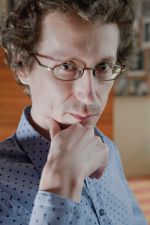 Michal Habaj (Slovakia) is a poet and a literary scientist. He is the author of the monographs Druhá moderna (The Second Modernism, 2005), Model človeka a sveta v básnickom diele Jána Smreka (The Concept of the Human and the World in the Poetry of Ján Smrek, 2013) and Básnik v čase. Smrek – Lukáč – Novomeský – Poničan (2016) and co-author of the Slovník diel slovenskej literatúry 20. storočia (Dictionary of the Works of Slovak Literature of the 20th Century, 2006) and Slovník diel slovenskej literatúry 19. storočia (Dictionary of the Works of Slovak Literature of the 19th Century, 2006). His books of poetry include: 80-967760-4-5 (1997), Gymnazistky. Prázdniny trinásťročnej (The High School Girls. The Holidays of a Thirteen Year-old Girl, 1999), Korene neba. Básne z posledného storočia (The Roots of Heaven. Poems of the Last Century, 2000), Básne pre mŕtve dievčatá (Poems for Dead Girls, 2004), Michal Habaj (2012) and Caput Mortuum (2015). Under the pseudonym Anna Snegina he published books of poems Pas de deux (2003) and Básne z pozostalosti (Poems from the Inheritance, 2009). He is one of the co-authors of the experimental poetry project Generator X: Hmlovina (Generator X: Nebula, 1999) and Generator X_2: Nové kódexy (Generator X_2: New Codices, 2013). He is also one of co-authors of the international project The European Constitution in Verse (Brussels, 2009). His poetry has been included in multiple anthologies and collections. Michal Habaj (Slovakia) is a poet and a literary scientist. He is the author of the monographs Druhá moderna (The Second Modernism, 2005), Model človeka a sveta v básnickom diele Jána Smreka (The Concept of the Human and the World in the Poetry of Ján Smrek, 2013) and Básnik v čase. Smrek – Lukáč – Novomeský – Poničan (2016) and co-author of the Slovník diel slovenskej literatúry 20. storočia (Dictionary of the Works of Slovak Literature of the 20th Century, 2006) and Slovník diel slovenskej literatúry 19. storočia (Dictionary of the Works of Slovak Literature of the 19th Century, 2006). His books of poetry include: 80-967760-4-5 (1997), Gymnazistky. Prázdniny trinásťročnej (The High School Girls. The Holidays of a Thirteen Year-old Girl, 1999), Korene neba. Básne z posledného storočia (The Roots of Heaven. Poems of the Last Century, 2000), Básne pre mŕtve dievčatá (Poems for Dead Girls, 2004), Michal Habaj (2012) and Caput Mortuum (2015). Under the pseudonym Anna Snegina he published books of poems Pas de deux (2003) and Básne z pozostalosti (Poems from the Inheritance, 2009). He is one of the co-authors of the experimental poetry project Generator X: Hmlovina (Generator X: Nebula, 1999) and Generator X_2: Nové kódexy (Generator X_2: New Codices, 2013). He is also one of co-authors of the international project The European Constitution in Verse (Brussels, 2009). His poetry has been included in multiple anthologies and collections. |
 Paul Hawkins (Great Britain) is a Bristol-based innovative poet, text artist and word-processor. He's the author of Claremont Road, Contumacy (both Erbacce Press) and Place Waste Dissent (Influx Press, 2015). He collaborates with Portuguese text artist/poet Bruno Neiva, co-authoring Servant Drone (KF&S Press, 2015) and The Secret of Good Posture (Team Trident Press, 2016). Paul is currently working on diisonance, a collaboration with artist Steve Ryan of artworks responding to Place Waste Dissent involving a series of events and exhibitions in Sheffield, London, Bournemouth and Bristol, UK. He co-runs Hesterglock Press. His next collection, Go Women (KF&S Press) is due out in 2018. Paul Hawkins (Great Britain) is a Bristol-based innovative poet, text artist and word-processor. He's the author of Claremont Road, Contumacy (both Erbacce Press) and Place Waste Dissent (Influx Press, 2015). He collaborates with Portuguese text artist/poet Bruno Neiva, co-authoring Servant Drone (KF&S Press, 2015) and The Secret of Good Posture (Team Trident Press, 2016). Paul is currently working on diisonance, a collaboration with artist Steve Ryan of artworks responding to Place Waste Dissent involving a series of events and exhibitions in Sheffield, London, Bournemouth and Bristol, UK. He co-runs Hesterglock Press. His next collection, Go Women (KF&S Press) is due out in 2018. |
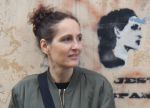 Regina Hilber (Austria) lives in Vienna and writes poetry, essays and prose. She received numerous awards and scholarships for her prose and poetry, and her poetry-cycles were translated into various languages. She currently lives in Germany, where she received a scholarship as "Burgschreiberin" ("castle writer") at the Beeskow castle. Among her most recent book publications are Land Recordings (Landaufnahmen, Limbus Verlag, 2016), Overwritings (Überschreibungen, Edition CH, 2017) and Schanker – A Report From Vienna (Schanker - ein Bericht aus Wien, Literaturedition Niederösterreich, 2014). Regina Hilber (Austria) lives in Vienna and writes poetry, essays and prose. She received numerous awards and scholarships for her prose and poetry, and her poetry-cycles were translated into various languages. She currently lives in Germany, where she received a scholarship as "Burgschreiberin" ("castle writer") at the Beeskow castle. Among her most recent book publications are Land Recordings (Landaufnahmen, Limbus Verlag, 2016), Overwritings (Überschreibungen, Edition CH, 2017) and Schanker – A Report From Vienna (Schanker - ein Bericht aus Wien, Literaturedition Niederösterreich, 2014). |
 Semier Insayif (Austria) is a freelance writer living in Vienna. He traveled around Austria and abroad, holding readings and speaking performances. He was published in various literary magazines, anthologies and appeared on the radio. So far he has written five books of poetry, among which are 69 specific reconciliation attempts (69 konkrete annäherungsversuche, wien 1998) or under soundness – poems in a double-tap sound (unter schall – gedichte im zweiklang, offizin s., meran 2007), and he also published a novel titled Faruq (haymonverlag innsbruck) in 2009. His latest poetry collection con victions (über zeugungen, Verlag Berger) was published in 2017. Over his career, he received various prizes and scholarships, including a literary scholarship from the Austrian Federal Ministry for Education, Arts and Culture for 2014/15. Semier Insayif (Austria) is a freelance writer living in Vienna. He traveled around Austria and abroad, holding readings and speaking performances. He was published in various literary magazines, anthologies and appeared on the radio. So far he has written five books of poetry, among which are 69 specific reconciliation attempts (69 konkrete annäherungsversuche, wien 1998) or under soundness – poems in a double-tap sound (unter schall – gedichte im zweiklang, offizin s., meran 2007), and he also published a novel titled Faruq (haymonverlag innsbruck) in 2009. His latest poetry collection con victions (über zeugungen, Verlag Berger) was published in 2017. Over his career, he received various prizes and scholarships, including a literary scholarship from the Austrian Federal Ministry for Education, Arts and Culture for 2014/15. |
 Aurélia Lassaque (France) is a bilingual poet writing in French and Occitan. She often collaborates with visual artists, videomakers, dancers and especially musicians. She has performed in Europe, Latin America, Africa, Scandinavian countries, Indonesia, India, and in numerous other places. She is an active advocate of linguistic diversity and acts as literary advisor for the "Paroles Indigo" festival in France and Africa and the "Premio Ostana, Scritture in Lingua Madre" in Italy. Her first poetry book, Pour que chantent les Salamandres, (Why Salamanders Sing, Editions Bruno Doucey, 2013) has been translated into English, Norwegian, Hebrew, Dutch, Catalan and received critical attention by, among others, The Guardian or the literary supplement of Al Araby Al Jadeed and Haaretz Daily. Her last book, En quête d'un visage (In Search of a Face, Bruno Doucey), was published in May 2017. Aurélia Lassaque (France) is a bilingual poet writing in French and Occitan. She often collaborates with visual artists, videomakers, dancers and especially musicians. She has performed in Europe, Latin America, Africa, Scandinavian countries, Indonesia, India, and in numerous other places. She is an active advocate of linguistic diversity and acts as literary advisor for the "Paroles Indigo" festival in France and Africa and the "Premio Ostana, Scritture in Lingua Madre" in Italy. Her first poetry book, Pour que chantent les Salamandres, (Why Salamanders Sing, Editions Bruno Doucey, 2013) has been translated into English, Norwegian, Hebrew, Dutch, Catalan and received critical attention by, among others, The Guardian or the literary supplement of Al Araby Al Jadeed and Haaretz Daily. Her last book, En quête d'un visage (In Search of a Face, Bruno Doucey), was published in May 2017. |
 Eva Luka (Slovakia) is a poet and a sensualist, who, in spite of linguistic abstractions, experiences poetry in a physical way. Her poems often have their origin in intense emotional experiences, wherein a particular instance is enriched by a dream, visions and fantastical pictures with an archetypal background. Her poems do not lack causality, but the large influence of emotions and the focus on subconscious testimony weakens the poetic logic. Luka's poetry can be easily described as a definition of depth psychology. She usually tries to capture instinctually dynamic relationships dealing with emotions and will. The collections Hlbokozelená žena/Deep Green Woman and Divosestra/Wild Sister expand Luka's thematic preoccupations to include her poetic travel accounts from Japan, where she studied Japanese language and literature from 1993 to 1995 and 1998 to 2002. Gradually, however, the influences of the exoticness of East Asian culture fade away (Diabloň). In the collection Havranjel this preoccupation is replaced by texts where Luka poetically defines objects – see the poems Tráva/Grass, Motýľ /Butterfly, Kameň/Stone, Slnečnica/Sunflower and others. This group of poems has helped Luka realise her place in the world and though an active engagement with it therapeutically undergo new aesthetic experiences which balance out personal tragedy. Eva Luka (Slovakia) is a poet and a sensualist, who, in spite of linguistic abstractions, experiences poetry in a physical way. Her poems often have their origin in intense emotional experiences, wherein a particular instance is enriched by a dream, visions and fantastical pictures with an archetypal background. Her poems do not lack causality, but the large influence of emotions and the focus on subconscious testimony weakens the poetic logic. Luka's poetry can be easily described as a definition of depth psychology. She usually tries to capture instinctually dynamic relationships dealing with emotions and will. The collections Hlbokozelená žena/Deep Green Woman and Divosestra/Wild Sister expand Luka's thematic preoccupations to include her poetic travel accounts from Japan, where she studied Japanese language and literature from 1993 to 1995 and 1998 to 2002. Gradually, however, the influences of the exoticness of East Asian culture fade away (Diabloň). In the collection Havranjel this preoccupation is replaced by texts where Luka poetically defines objects – see the poems Tráva/Grass, Motýľ /Butterfly, Kameň/Stone, Slnečnica/Sunflower and others. This group of poems has helped Luka realise her place in the world and though an active engagement with it therapeutically undergo new aesthetic experiences which balance out personal tragedy. |
 Tom Petsinis (Australia) was born in Macedonia, Greece and immigrated to Australia as a child. He is a novelist, playwright, poet, and mathematics lecturer at Victoria University, Melbourne. Tom has published seven collections of poetry, including Naming the Number, Breadth for a Dying Word, My Father's Tools and Four Quarters, which won the Wesley Michel Wright Poetry Prize. Of his five plays The Drought won the Wal Cherry Playscript of the Year Award and was short-listed for the Victorian Premier's Award. His four works of fiction include the novels The Twelfth Dialogue and The French Mathematician, nominated for both the New South Wales and South Australian Premier's Award. His work has been translated into a number of languages. Tom Petsinis (Australia) was born in Macedonia, Greece and immigrated to Australia as a child. He is a novelist, playwright, poet, and mathematics lecturer at Victoria University, Melbourne. Tom has published seven collections of poetry, including Naming the Number, Breadth for a Dying Word, My Father's Tools and Four Quarters, which won the Wesley Michel Wright Poetry Prize. Of his five plays The Drought won the Wal Cherry Playscript of the Year Award and was short-listed for the Victorian Premier's Award. His four works of fiction include the novels The Twelfth Dialogue and The French Mathematician, nominated for both the New South Wales and South Australian Premier's Award. His work has been translated into a number of languages. |
 Natasha Sardzoska (Macedonia) is a poet, writer, interpreter and translator, holds a PhD in anthropology from Eberhard Karls University of Tübingen, Sorbonne Nouvelle in Paris and University of Bergamo. She has published the poetry books Blue Room, Skin, He pulled me with invisible string and Living Water. She had a poetry reading at the International Poetry Festival in Genova, where her performance was accompanied by a-cappella singing by the French jazz singer Charlène Puyguiraud and body-painting with the Italian artist Cosimo Frezzolini. At the Modoars Festival for Contemporary Music, she has performed her poetry with Milica Dobaj (soprano, Montenegro) and Ema Popivoda (piano, Macedonia). Her poetry intertwines reminiscences of the flesh, exposes inner pain and reveals spiritual freshness; her poetic memory has performative character, capturing the chamber space dramaturgy of the human existence. Natasha Sardzoska (Macedonia) is a poet, writer, interpreter and translator, holds a PhD in anthropology from Eberhard Karls University of Tübingen, Sorbonne Nouvelle in Paris and University of Bergamo. She has published the poetry books Blue Room, Skin, He pulled me with invisible string and Living Water. She had a poetry reading at the International Poetry Festival in Genova, where her performance was accompanied by a-cappella singing by the French jazz singer Charlène Puyguiraud and body-painting with the Italian artist Cosimo Frezzolini. At the Modoars Festival for Contemporary Music, she has performed her poetry with Milica Dobaj (soprano, Montenegro) and Ema Popivoda (piano, Macedonia). Her poetry intertwines reminiscences of the flesh, exposes inner pain and reveals spiritual freshness; her poetic memory has performative character, capturing the chamber space dramaturgy of the human existence. |
 Titilope Sonuga (Canada/Nigeria) is an award-winning poet, writer and performer. She is the first poet to appear at a Nigerian presidential inauguration. She was the winner of the 2011 Canadian Authors' Association Emerging Writer Award for her first collection of poems, Down To Earth. Her second collection, Abscess, was published in 2014 by Geko Publishing. Her work has appeared in several publications and been translated into Italian and German. She was an OSIWA Foundation Resident Poet on Gorée Island in 2015 and was published in its Soaring Africa anthology with twenty select poets from across the African continent. She was a speaker at TedxEdmonton in 2014 and was the 2015 - 2016 ambassador for Intel Corporation's She Will Connect Program in Nigeria. Titilope Sonuga (Canada/Nigeria) is an award-winning poet, writer and performer. She is the first poet to appear at a Nigerian presidential inauguration. She was the winner of the 2011 Canadian Authors' Association Emerging Writer Award for her first collection of poems, Down To Earth. Her second collection, Abscess, was published in 2014 by Geko Publishing. Her work has appeared in several publications and been translated into Italian and German. She was an OSIWA Foundation Resident Poet on Gorée Island in 2015 and was published in its Soaring Africa anthology with twenty select poets from across the African continent. She was a speaker at TedxEdmonton in 2014 and was the 2015 - 2016 ambassador for Intel Corporation's She Will Connect Program in Nigeria. |
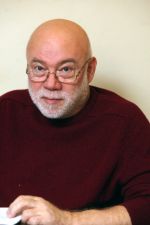 Ján Štrasser (Slovakia) was born in Košice, Slovak Republic, studied Russian and Slovak languages and literatures at the Faculty of Arts of Comenius University in Bratislava. In the mid-1960s, he started publishing poetry and criticism, and became editor of a magazine for young writers Mladá tvorba (Young Creation). He later worked as a theatre dramaturge and held various editorial positions in several literary magazines. He has published 10 poetry collections, among which are Odriekanie (Renouncing, 1968), Práca na ceste (Road Work, 1989) or Staré železo (Scrap Metal, 2007). He has also published numerous books of literary criticism, essays and interviews. He has translated Russian classical and modern literature (Pushkin, Lermontov, Pasternak, Charms and others). For his translation of Jevgenij Onegin, he received several awards. In collaboration with researcher Peter Zajac, he has translated German poetry and drama (Brecht, Benn, Eich, an anthology of German expressionism and many others). Ján Štrasser (Slovakia) was born in Košice, Slovak Republic, studied Russian and Slovak languages and literatures at the Faculty of Arts of Comenius University in Bratislava. In the mid-1960s, he started publishing poetry and criticism, and became editor of a magazine for young writers Mladá tvorba (Young Creation). He later worked as a theatre dramaturge and held various editorial positions in several literary magazines. He has published 10 poetry collections, among which are Odriekanie (Renouncing, 1968), Práca na ceste (Road Work, 1989) or Staré železo (Scrap Metal, 2007). He has also published numerous books of literary criticism, essays and interviews. He has translated Russian classical and modern literature (Pushkin, Lermontov, Pasternak, Charms and others). For his translation of Jevgenij Onegin, he received several awards. In collaboration with researcher Peter Zajac, he has translated German poetry and drama (Brecht, Benn, Eich, an anthology of German expressionism and many others). |
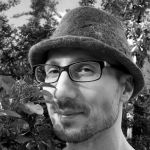 Viktor Suchý (Slovakia) worked as a Slovak language teacher (Faculty of Education CU, Metodova High School), a bookseller (Ex Libris, Artforum) and an editor of several literary magazines (OSi, Slovo, Kultúrny život). He lives in Bratislava and works as a book editor and librarian. He graduated from the Faculty of Arts at the Prešov University with a diploma thesis titled Discovering the Slowness, which made him a lentologist – an expert on the slow way of life. He is the chairman of the civil association Upupa epops which runs The Cabinet of Slowness – a library, school and book club in one. In July 2017 he published the collection of poetry Weather Poems (at Modrý Peter) – 33 minimal triplets close to the genre of haiku, aphorism and riddles, accompanied by 8 black-and-white photographs taken by the author himself. Viktor Suchý (Slovakia) worked as a Slovak language teacher (Faculty of Education CU, Metodova High School), a bookseller (Ex Libris, Artforum) and an editor of several literary magazines (OSi, Slovo, Kultúrny život). He lives in Bratislava and works as a book editor and librarian. He graduated from the Faculty of Arts at the Prešov University with a diploma thesis titled Discovering the Slowness, which made him a lentologist – an expert on the slow way of life. He is the chairman of the civil association Upupa epops which runs The Cabinet of Slowness – a library, school and book club in one. In July 2017 he published the collection of poetry Weather Poems (at Modrý Peter) – 33 minimal triplets close to the genre of haiku, aphorism and riddles, accompanied by 8 black-and-white photographs taken by the author himself.
|
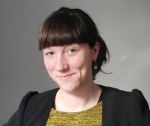 Lies van Gasse (Belgium) is a Flemish poet and artist. After numerous publications in journals, her debut collection Hetzelfde gedicht steeds weer (The same poem over and over again) was published in 2008. It was followed by Brak de Waterdrager (Broke the Water Carrier) (2011), M (2012, bibliophile edition) and Wenteling (Revolution) (2013). Van Gasse introduced the genre of the graphic poem, a mixed format of words and images, into the Dutch-speaking region. In 2010, her first graphic poem, Sylvia, was published, followed later by Zand op een zeebed (Sand on a sea bed) (2015). Not only does she combine words and images in her graphic poems, but she also makes use of the uniqueness of the genre to enter into a poetic dialogue with fellow authors: between 2009 and 20013 and together with Annemarie Estor, she for example set up a multidisciplinary project around the figure of Caspar Hauser that resulted in a book, an exhibition and a multimedia show. Lies Van Gasse's work was awarded the Prize of the Province of East Flanders and her graphic work has already been exhibited in numerous places. Lies van Gasse (Belgium) is a Flemish poet and artist. After numerous publications in journals, her debut collection Hetzelfde gedicht steeds weer (The same poem over and over again) was published in 2008. It was followed by Brak de Waterdrager (Broke the Water Carrier) (2011), M (2012, bibliophile edition) and Wenteling (Revolution) (2013). Van Gasse introduced the genre of the graphic poem, a mixed format of words and images, into the Dutch-speaking region. In 2010, her first graphic poem, Sylvia, was published, followed later by Zand op een zeebed (Sand on a sea bed) (2015). Not only does she combine words and images in her graphic poems, but she also makes use of the uniqueness of the genre to enter into a poetic dialogue with fellow authors: between 2009 and 20013 and together with Annemarie Estor, she for example set up a multidisciplinary project around the figure of Caspar Hauser that resulted in a book, an exhibition and a multimedia show. Lies Van Gasse's work was awarded the Prize of the Province of East Flanders and her graphic work has already been exhibited in numerous places. |
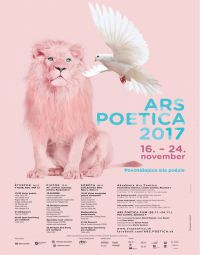
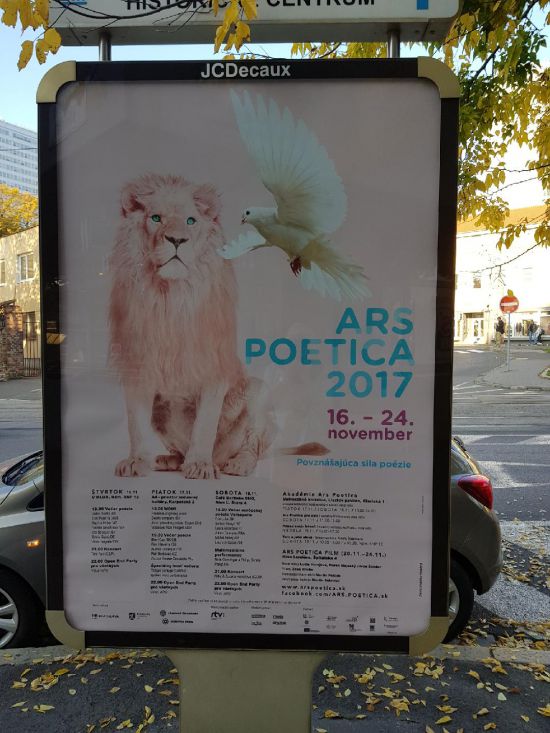
 Ars Poetica 2017 imidžový citylight na stiahnutie
Ars Poetica 2017 imidžový citylight na stiahnutie Videospot – pozvánka na festival
Videospot – pozvánka na festival